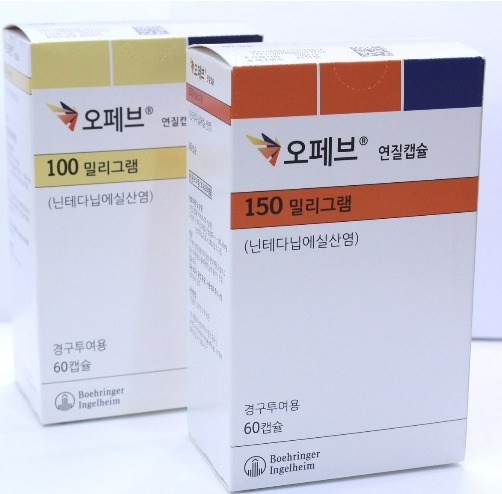The stalled health insurance coverage of Ofev (nintedanib), a treatment for the rare and incurable disease pulmonary fibrosis, is drawing renewed attention to whether to end its lengthy process.
The drug is also expected to be on the agenda for next month's final Pharmaceutical Reimbursement Review Committee (PREC) meeting. Behringer Ingelheim, which owns Ofev, reportedly applied for coverage to the Health Insurance Review and Assessment Service (HIRA) in March.

In 2016, Ofev won approval from the Ministry of Food and Drug Safety (MFDS) as a treatment for idiopathic pulmonary fibrosis (IPF) and later expanded its indication to include advanced interstitial lung disease (ILD). Still, it remains unreimbursed. Currently, treatment costs more than 3 million won ($2,140) monthly, limiting patient access.
Notably, Ofev is the only treatment available for advanced pulmonary fibrosis, but its cost makes it difficult to prescribe.
Pirfenidone, which is reimbursed, has been shown to cause about half of patients to stop taking it within a year due to side effects. Ofev, on the other hand, is already covered in major countries, including the United States, Japan, and the United Kingdom.
With pulmonary fibrosis affecting 1 in 500 to 1,500 men over 60, the medical community expects the number of patients to increase as the population ages. Early treatment can reduce medical costs, but the delay in coverage is wasting health insurance funds.
At a forum on improving access to rare disease drugs hosted by Rep. Seo Young-seok of the Democratic Party of Korea on Sept. 24, it was pointed out that pulmonary fibrosis has the highest mortality rate and medical cost burden among rare diseases. Early intervention through drug treatment is also effective in reducing mortality and medical costs.
“Although our association has provided Ofev drug cost support since its approval in 2016, the financial burden on patients is still high. Although the drug does not cure but eases symptoms and inhibits progress, it is expensive at over 3 million won per month, causing a great burden on patients,” Park Jung-sook, general manager of the Korea Blood Disease and Cancer Association (KBDCA) that runs the Ofev drug cost support program, told Korea Biomedical Review over the phone.
In addition to the drug's cost, patients with pulmonary fibrosis must also pay an additional 500,000 won per month to rent a ventilator, adding to the burden of treatment-related costs. Despite the financial burden, many patients continue to take Ofev because it improves their quality of life, Park explained.
“The association has worked toward reimbursement this year by collecting opinions through patient meetings and submitting comments to the HIRA,” Park said. “After eight years of waiting for reimbursement, patients’ expectations are higher than ever. We look forward to improving patient access to care through this review.”
Lee Eun-young, a co-representative of the Korea Leukemia Patient Organization, who called for patients’ voices to be included in the assessment of reimbursement adequacy at a symposium in September, pointed to the government's lukewarm attitude in a telephone interview with Korea Biomedical Review.
“Unfortunately, the government is still slow to implement the expanded risk-sharing program,” Lee said. “As Ofev is an urgent treatment for critically ill patients, the government and pharmaceutical companies must consider the patient's situation and speed up the process. The pharmaceutical companies need to submit their data. Still, it is also necessary for the government to put patients in urgent need first.”
Related articles
- [Reporter's Notebook] Ofev’s case shows why multinational pharmas overlook Korean market
- Pulmonary fibrosis drug Ofev nears key reimbursement decision in Korea
- Delayed insurance coverage for pulmonary fibrosis drug Ofev sparks calls for reimbursement reform
- Insurance review panel gives green light to Tevimbra, Ofev, and Pemazyre
- Boehringer Ingelheim Korea GM seeks to drive new era of R&D and innovation
- Ildong Pharm launches Ofev generic as Korea's ILD market competition heats up
- After 9-year wait, Boehringer’s IPF drug Ofev faces generic threat weeks into Korea launch

